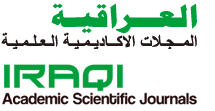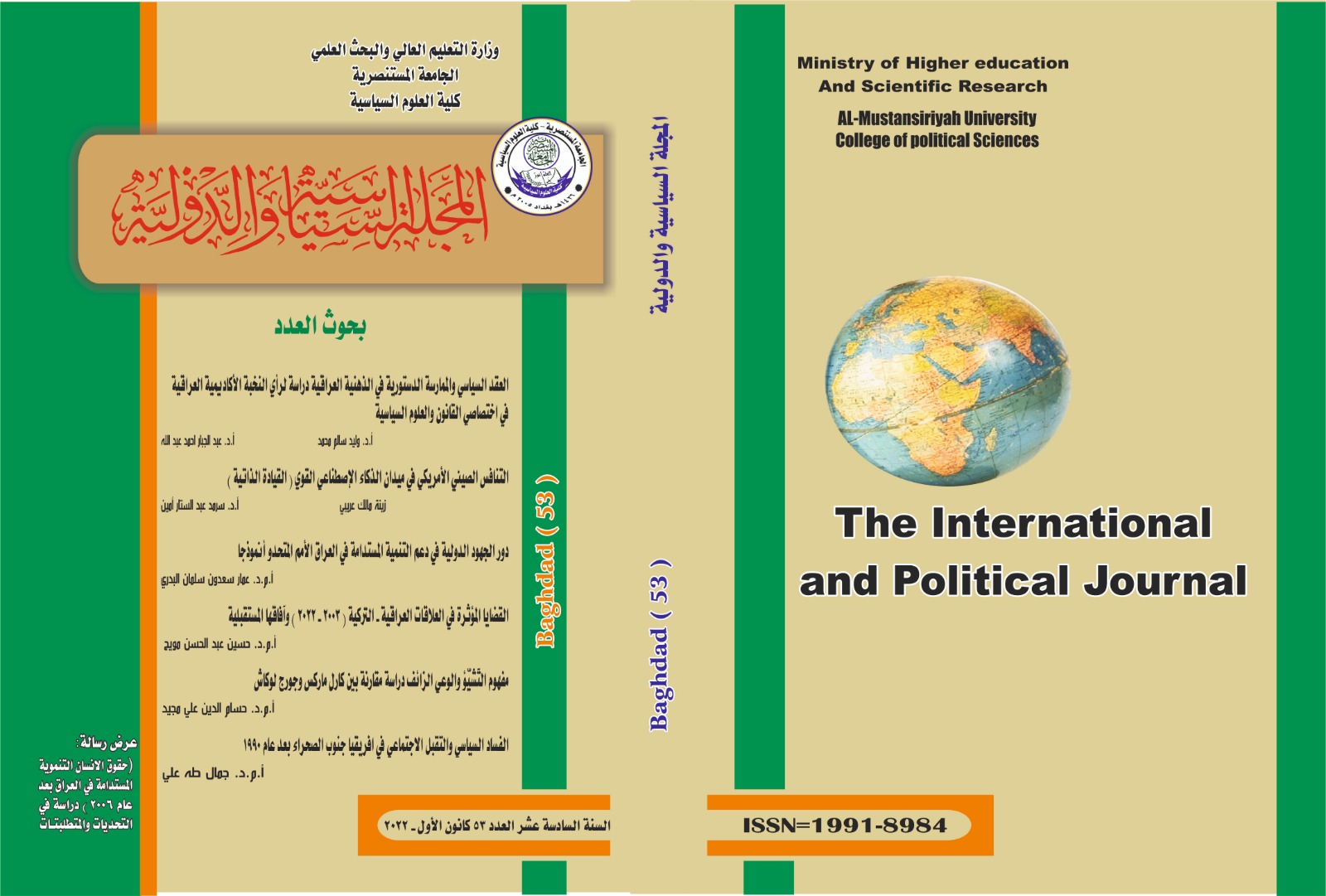The Kuwaiti political system: a structural study
DOI:
https://doi.org/10.31272/ipj.i55.174Keywords:
Kuwait Political System, Parliament, CrisesAbstract
The system of government in the State of Kuwait is Amiri and Democratic. The State of Kuwait is a sovereign and has a constitution. It is headed by an Emir. Its laws are legislated by the National Assembly which consists of fifty members elected every 4 years through free popular voting. The authorities in Kuwait are divided into three branches: executive, legislative, and judicial, and all of them are headed by the Emir. According to the constitution, it is not permitted to form parties, despite the presence of parliamentary blocs. The system of government in Kuwait is characterized by a mixture of the parliamentary system and the presidential system. All laws approved by the National Assembly become effective after the Emir’s ratification within a month of their issuance. In the event that a month passes without ratification, the laws take effect as if they were ratified. If the Emir returns them to the Assembly and approves them again, they become effective without sending them again to the Emir.
References
المصادر باللغة العربية :
ابوحاكمة ، احمد وآخرون. ١٩٨٦ . الكويت، ربع قرن من الاستقلال. الكويت: مطبعة حكومة الكويت,سلسلة فصلية تصدرها مجلة العربي، الكتاب العاش.
نوفل ، احمد سعيد. 2006. مقال، جريدة الغد الاردنية . 29 حزيران.
التعاون العدلي والقضائي. 2023. شبكة المعلومات القانونية لدول مجلس التعاون الخليجي. http://www.gcc-legal.org/moj.
1976" . بیان الامير و اصل کتاب الاستقالة". الكويت: مجلة دراسات الخليج والجزيرة العربية، العدد الثامن.
الدستور الكويتي .
الجبوري ، جبار اسماعيل. 2006. النظام سياسي الكويتي . "دراسة تحليلية للتطورات السياسية المعاصرة ". رسالة ماجستير غير منشورة ، كلية العلوم السياسية, جامعة بغداد، ص110.
قاسم ، جمال زكريا. ١٩٧٤. الخليج العربي - دراسة التاريخية المحاضر ١٩٤٥ - ۱۹۷۱. القاهرة: معهد البحوث والدراسات العربية.
الإبراهيم ، حسن على. 2016. الكويت دراسة سياسية. بيروت: دار النهار للنشر.
إبراهيم ، حسن علي. 1982. الدول الصغيرة والنظام الدولي :الكويت والخليج. بيروت : مؤسسة الابحاث العربية.
البحارنة ، حسين محمد. ۱۹۷۳. دول الخليج العربي الحديثة، علاقاتها الدولية وتطوير الاوضاع السياسية والقانونية والدستورية فيها. بيروت : شركة بردود يكون مكتبة مؤسسة الحياة ،.
عصفور ، سعد. ١٩٥٤. القانون الدستوري. الاسكندرية: دار المعارف.
ابراهيم ، طلال صالح. 2000. "التجربة النيابية مالها وما عليها." مجلة السياسة الدولية 142 (36): ص71.
الطبطبائي ،عادل. 1985. "سلطة التشريعية في دول الخليج العربي،." مجلة دراسات الخليج والجزيرة العربية.
حسن ، عبد الفتاح. 1969. مبادئ النظام الدستوري في الكويت. بيروت: دار النهضة للطباعة والنشرة.
السلطان ، فاخر. 2008. "نص كلمة امير الكريت بحل مجلس الامة." جريدة القبس. https://elaph.com/Web/AkhbarKhasa/2008/3/313896.htm .
الحترس ، فتوح عبد المحسن. ١٩٧٤. تاريخ العلاقات السياسية البريطانية الكويتية ، ١٨٩٠ - ١٩٢١، . الكويت : نشورات دار ذات السلاسل ، مطابع دار الطليعة ، ط1.
قلعجي ، قدري. ١٩٦٢. اضراء على تاريخ الكويت. بيروت: دار الكاتب العربي.
الجاسم ، محمد عبد القادر. 2009. المحكمة الدستورية نحواصلاح جذري ، دراسة نظرية وعملية. الكويت: دار القرطاس للنشر , ط1.
الرحيمي ، محمد غانم. ١٩٧٠ . قضايا التغيير السياسي والاجتماعي في البحرين . الكويت: مؤسسة الوحدة للنشر والتوزيع.
الكندري ، مريم. 2002. تقرير بشأن اعلان لاحكام العرفية في الكويت. الكويت: دراسات وبحوث، 1-2. http://www.malles.alommah.net/.
النجار ، مصطفى عبد القادر. ١٩٨٤. تاريخ الخليج العربي الحديث والمعاصر. ، ط1, مطبعة جامعة البصرة.
الشبطي ، ناصر عبد الله. 1996. مجلس الامة ١٩٩٢ بين البرامج الانتخابية والانجازات. الكويت: كويت برس,ط1.
المطيري ، نقا. 1997. تعريف محكمة التميز. الكويت: دراسات وبحوث. www.Majlesalom mahonet.
سید ، نوفل,. ١٩٦٠. الاوضاع السياسية لاسارات الخليج العربي وجنوب الجزيرة. القاهرة: معهد الدراسات العربية العالية , جامعة الدول العربية، مطبعة نهضة مصر.
رأفت ، وحيد. 1989. التشريع الكويتي. الكويت: شبكة المعلومات القانونية لدول مجلس التعاون الخليجي.
يحيى. ١٩٧١. النظام الدستوري في الكويت. الكويت.
المصادر باللغة الانكليزية :
Abuhakma, Ahmed et al. 1986. alkuayt, rubue qarn min alaistiqlali [Kuwait, a quarter of a century of independence]. Kuwait: Kuwait Government Press, a quarterly series published by Al-Arabi Magazine, Al-Kitab Al-Ash.
Nofal, Ahmed Saeed. 2006. Article, Al-Ghad newspaper, Jordan. June 29.
Justice and judicial cooperation. 2023. GCC Legal Information Network. http://www.gcc-legal.org/moj .
--.1976. The Emir's statement and the original letter of resignation. Kuwait: Journal of Gulf and Arabian Peninsula Studies, No. 8.
The Kuwaiti Constitution.
Al-Jubouri, Jabbar Ismail. 2006." alnizam siasiu alkuaytiu [The Kuwaiti Political System. An analytical study of contemporary political developments]". Unpublished master's thesis, College of Political Science, University of Baghdad, p. 110.
Qasim, Jamal Zakaria. 1974. alkhalij alearabii - dirasat altaarikhimat almuhadir 1945 - 1971 [The Arabian Gulf - Study of the Lecturer's History 1945-1971]. Cairo: Institute for Arab Research and Studies.
Al-Ibrahim, Hassan Ali. 2016. alkuayt dirasat siasiatun [Kuwait, a political study]. Beirut: An-Nahar Publishing House.
Ibrahim, Hassan Ali. 1982. alduwal alsaghirat walnizam alduwliu :alkuayt walkhalija [Small States and the International System: Kuwait and the Gulf]. Beirut: Arab Research Foundation.
Al-Baharna, Hussain Mohammed. 1973. dual alkhalij alearabii alhadithati, ealaqatuha alduwaliat watatwir alawdae alsiyasiat walqanuniat waldusturiat fiha [The modern Arab Gulf states, their international relations and the development of the political, legal and constitutional conditions therein]. Beirut: Bardoud Company, Al-Hayat Foundation Library.
Asfour, Saad. 1954. The Constitutional law. Alexandria: Dar al-Maarif.
Ibrahim, Talal Saleh. 2000. “altajribat alniyabiat maluha wama ealayha [Parliamentary Experience: Its Pros and Cons].” International Policy Journal 142 (36): p. 71.
Al-Tabtabaei, Adel. 1985. “sultat altashrieiat fi dual alkhalij alearabii, [The Legislative Authority in the Arab Gulf States].” Journal of Gulf and Arabian Peninsula Studies.
Hassan, Abdel Fattah. 1969. mabadi alnizam aldusturii fi alkuayt.[ Principles of the Constitutional System in Kuwait]. Beirut: Dar Al-Nahda for printing and publishing.
Sultan, Fakher. 2008. “Text of the speech of the Emir of Crete to dissolve the National Assembly.” Al-Qabas newspaper. https://elaph.com/Web/AkhbarKhasa/2008/3/313896.htm.
Al-Hateras, Fatouh Abdel-Mohsen. 1974. A history of British Kuwaiti political relations, 1890-1921. Kuwait: Dar That Al-Salasil publications, Dar Al-Talee'a Press, 1st edition.
Qalaji, my destiny. 1962. adira' ealaa tarikh alkuayti [A light on the history of Kuwait]. Beirut: Dar Al-Kateb Al-Arabi.
Al-Jassim, Muhammad Abdul Qadir. 2009. The Constitutional Court Towards Radical Reform, A Theoretical and Practical Study. Kuwait: Al-Qertas Publishing House, 1st Edition.
Al-Rahimi, Muhammad Ghanem. 1970. qadaya altaghyir alsiyasii waliajtimaeii fi albahrayn [ Issues of political and social change in Bahrain. Kuwait]: Al-Wahda Foundation for Publishing and Distribution.
Al-Kandari, Maryam. 2002. Report on the Declaration of Martial Law in Kuwait. Kuwait: Studies and Research, 1-2. http://www.malles.alommah.net /.
Al-Najjar, Mustafa Abdel-Qader. 1984. History of the modern and contemporary Arab Gulf. 1st edition, Basra University Press.
Al-Shabti, Nasser Abdullah. 1996. National Assembly 1992 between electoral programs and achievements. Kuwait: Kuwait Press, 1st edition.
Al-Mutairi, Nqa. 1997. taerif mahkamat altamayuzu [Defining the Court of Cassation]. Kuwait: Studies and Research. www.Majlesalom mahonet.
Syed, Nawfal. 1960. alawudae alsiyasiat liasarat alkhalij alearabii wajanub aljazirati [ The political situation of the families of the Arabian Gulf and the south of the island]. Cairo: Institute of Higher Arab Studies, League of Arab States, Nahdet Misr Press.
Raafat, Waheed. 1989. altashrie alkuaytiu [Kuwaiti Legislation]. Kuwait: Legal Information Network of the Gulf Cooperation Council Countries.
Yahya. 1971. The constitutional system in Kuwait. Kuwait.
Additional Files
Published
How to Cite
Issue
Section
License

This work is licensed under a Creative Commons Attribution 4.0 International License.
Journal Policies
All articles published in the International and Political Journal are licensed under a Creative Commons Attribution 4.0 International License. This means that the Authors can:
The journal allows reuse and remixing of content in accordance with a Creative Commons license.
Copy and redistribute the material in any medium or format.
Policy of publishing in The International and Political Journal
The journal is committed to the ethics of scientific publishing, and according to the publication ethics report of the journal.
The decision to publish is based on the value of the scientific research, to what extent it meets the conditions of publication approved, the declared policy of the journal, and its specialty.
It is based on the principles of the scientific honesty, and originality of research submitted for publication. It deals with the names of reviewers and their reports with great confidentiality.
The opinions published in the journal reflect the views of the authors, and not necessarily reflect the opinion of the editorial board.
The journal does not adhere to the publication of whatever comes to it. The time and place of publication are subject to technical considerations adopted in the editorial plan of the journal.
The journal does not abide to return the research papers to their owners whether accepted for publication or not.
The researcher is to be provided with the acceptance of publication within about 24 WEEKS. As for publication, the editorial board reserves its right in priority of publishing. The arrangement of the research papers in the same issue is subject to technical standards.
Diversify of publishing papers from solid universities and scientific centers from inside and outside Iraq is preferable.
The journal maintains hard copies and electronic archive of the published issues in addition to the publication of the research papers.
The journal also publishes the issues electronically through the website of the journal, and the official website of the Iraqi academic journals, and makes it possible to download. Thus, documenting the intellectual property of the research papers and publishing them internationally is achieved.
Terms of publication may be modified when necessary with no previous notice.
The researcher obtains a copy of his research paper. If he wishes to buy acopy of the journal, the volume costs ID 10000 from inside Iraq and $8from the outside.
The Editorial Board considers that the researcher who submits his research paper for publication in the journal has already read the terms and conditions of publication and agreed on them.
The journal publishes the research papers of the postgraduate students in special issues for this purpose.
Stages of editing and publishing:
The researcher undertakes that his research has never been published before, and has not been submitted for publication to other sides until the end of the evaluation procedures and the acceptance of publication in the journal.
The research papers submitted for publication are to subjected for preliminary examination by the editorial board to determine their suitability for the journal specialization, its policy and the safety of scientific research procedures, and then to indicate its eligibility for scientific evaluation. The editorial board may apologize for accepting the research all together or require the researcher to amend it in accordance with the journal policy before sending it to editors.
After conducting the scientific evaluation, the research paper returns back to the researcher to make the required amendments within a maximum of two weeks.
A copy of the final research paper is to be submitted to the secretariat of the journal a hard copy and a soft copy on a CD, in both Word and PDF format. The researcher is fully responsible for the typing and linguistic mistakes after submitting the full research paper on a CD.
Plagiarism checker
All research papers are subjected to Turnitin program to uncover plagiarism before being sent to scientific evaluation. The researcher undertakes a written pledge to take the legal and moral responsibility, in the event of the emergence of plagiarism or taking from the efforts of other researchers, without a reference to them. The journal uses appropriate anti-plagiarism software, such as Turnitin to check for plagiarism.
Dealing with Allegations of Research Misconduct
The Journal shall take reasonable and serious steps to identify and prevent the publication of papers where research misconduct has occurred, including plagiarism, citation manipulation, and data falsification/fabrication.
Scientific Evaluation:
Scientific evaluation strengthens the research paper submitted to the journal and helps to take the appropriate decision by the editorial board to publish it. It also benefits the researchers to improve and correct their research papers.
The research paper is sent to three evaluators in the same specialty to evaluate












